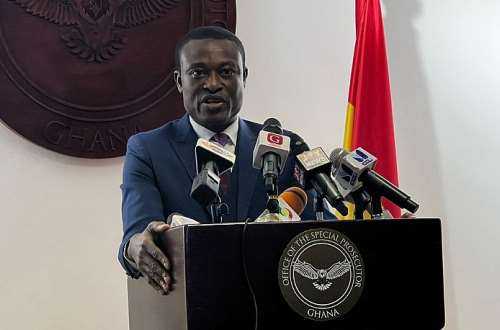Kissi Agyebeng is Special Prosecutor
The Office of the Special Prosecutor (OSP) has announced that it is investigating suspected corruption and corruption-related offences in respect of the large-scale sale of appointment letters to prospective teachers and laundering of the proceeds of the unlawful enterprise.
This was revealed in the 2025 half-year report released on Tuesday, August 19.
The report also stated that the Office is investigating the operations of National Commission on Culture between 2020-2024 with particular focus on suspected corruption and extortion in relation to the payment of staff salaries and salary arrears.
The Special Prosecutor, Kissi Agyebeng, in the preface of the report, said that his office recognises that the fight against corruption cannot be waged and won only through punitive action and incarceration.
Indeed, he said, the legislative set-up of the Office leans heavily on corruption prevention and asset recovery and disgorgement of tainted property.
Consequently, he said they proceeded on sustainable anticorruption outcomes by pairing enforcement with robust prevention and asset recovery, especially founded on our unique plea bargaining regime.
In this spirit, the Office scaled up its preventive mandate through active engagement with public institutions, private sector actors, and civil society, and secured convictions and asset recovery through impactful plea bargaining, he said.
Mr Agyebeng said “We also reckon that the nation’s anti-corruption legal framework requires re-imagination, modernisation and retooling to address the immense scale and complexity of modern corruption in the context of our social, economic and political constructs.”
On this score, he said, “the Office has proposed the inclusion of a new chapter in the Constitution dedicated to the fight against corruption to stamp the republic’s collective opprobrium against corruption through definitive constitutional expression by the institution of proposed concrete measures to effectively and comprehensively suppress and repress corruption in public life as well as in the private sector – chief among which include lifestyle audit non-conviction-based asset recovery, enhanced asset declaration and verification regime, and a reverse onus presumption of corruption as the foundation of both anti-corruption criminal proceedings and civil asset recovery proceedings.”
He also said that the Office is also leading the charge in respect of the passage of a comprehensive Corrupt Practices Act and Conduct of Public Officers Act.
“Then again, the Office, as one of three implementing partners of the new National Ethics and Anti-Corruption Strategy and Implementing Plan, is fashioning and moulding anti-corruption structures that would stand the test of time. The task ahead remains formidable. Much more so is our resolve to perform,” he said.
Source:3news.com


